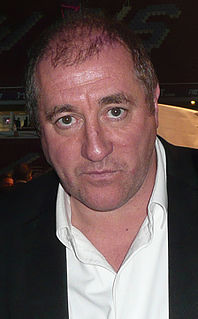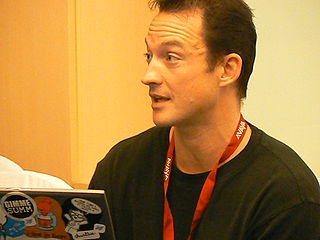A Quote by Steve Bunce
If I was switched from whatever I'm doing, and I was, for some reason, made the chief football writer in any newspaper, then I'd retire. I'd go back to being a barber.
Related Quotes
My abject hatred of actors and the acting world. I went to college as an actor, and halfway through, I switched to playwriting and directing. Then I spent a couple years working in publishing, doing some freelance journalism for The Village Voice and Musician magazine. I thought my life was going to be as a writer, but then I realized I missed performing, so I got into comedy. It was a nice combination of things I was sort of good at. I was a pretty good writer and a decent actor, but I didn't really like acting, and I didn't have the discipline to be a writer.
I was writing everything. I grew up in Albany, New York, and I was never any farther west than Syracuse, and I wrote Westerns. I wrote tiny little slices of life, sent them off to The Sewanee Review, and they always sent them back. For the first 10 years I was published, I'd say, "I'm a writer disguised as a mystery writer." But then I look back, and well, maybe I'm a mystery writer. You tend to go where you're liked, so when the mysteries were being published, I did more of them.
At some point along the way, I stopped being a writer, and I became a black writer. I never used to be a black writer. I used to write 'Spider-Man,' 'Green Lantern,' whatever was lying around. 'Thor,' 'Hulk,' whatever. Now, if the phone rings or when the phone rings, it's almost exclusively some project that has something to do with my ethnicity.
Her family had no such ties. She was able to forge her way into that world. And then to those people, the idea of going to Arkansas, if you're gonna stop and think about it, you don't do it. It wouldn't have made any sense. It's like going to Mississippi. Why would you go to Alabama? You wouldn't go. You wouldn't... That would be throwing your life away! [...] For some reason, Hillary Clinton wanted to latch on to this guy [Bill Clinton] - and for some reason, this guy wanted her to latch on to him.
No matter what's in your head, you go up into any hospital, up to a terminal ward and it'll smack you right back into reality that, "Hey man, whatever you're dealing with, if it's heavy on your heart and head, you're gonna have to let that go, because there, some people are dealing with unavoidable situations that they can't let go." And then they eventually let those go, so, I mean, that's helpful.
































